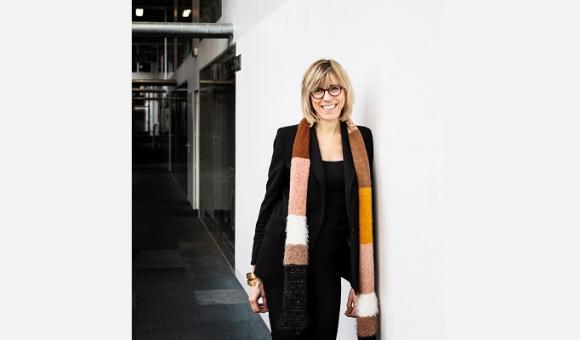
For 15 years, through her agency Caracas, she has brilliantly orchestrated the press relations of the key players in the cultural and artistic world of Wallonia and Brussels. Even, when she considers it necessary, throwing around certain clichés.
Art, fashion and design in the broad sense: you were born into it all?
My interest in art is connected to my upbringing. In my parents’ home, there were books and art works everywhere. My mother was also very avant-garde in terms of her clothing choices. Very early in life, I perceived that design was a vector of emancipation.
This idea of emancipation is also part of your values and those of the brands, institutions and projects that you support in your agency.
Art only has sense when it is linked to this idea of emancipation. For me, it is one of the four pillars that define design as I understand it. The other three are the search for innovation, the questions about nature, and all the inherent subtility of poetry, which is another passion of mine. In terms of collaborations, my choices are instinctive. I believe in the converging of intelligences. Purely strategic reflections are, in my opinion, not very promising.
How do you choose your projects?
In the art domain, I need to see the uniqueness of the project, its intelligence. If the project is about design or fashion, it is critical to never lose sight of the economic criterion. In general, there is too little support promoting economic development. But if a project does not have commercial support, the best communication strategy in the world will not be enough to make it viable.
You speak about commercial potential. What else does a project need to have a chance of success?
It must offer concrete solutions to the specific problems, rather than being purely about consumption. During my frequent travels in India, I am constantly struck by the efforts the country is making to preserve its know-how. The objects you find there correspond to everyday actions. Here, we are overwhelmed with purely decorative objects. We seek the material rather than the existential. I believe in simple things that can be passed down. My grandmother always said she bought for three generations. That has become my obsession, as well.
Has living with an artist (Ed: plastic artist Johan Muyle) changed your world vision?
The artist does not play a role. He creates based on his own values. When you share the life of such an artist, you necessarily adhere to those. In my case, I live with an accumulator. His relationship with objects is linked to his research on the subject. Living surrounded by these objects accentuates my need for emptiness. Through this contact, I have thus become even less materialistic.
You are talking about good neighbourliness…
Over 15 years, my agency has supported most of the openings of the museums in Wallonia and Brussels. During the opening of the La Boverie in Liege last year, visitors to Maastricht arrived in droves. To me, it is better to capitalise on an existing crucible. In Wallonia in particular, the dynamics are real and very enthusiastic. Art, fashion, design and theatre coexist there; there are numerous synergies. Too many young projects rest on artificial constructs, whereas it is more productive to perceive economics as something viral. My specificity is my roots in the Hinterland: the Liege/Maastricht/Aachen network and the Mons/northern France zone.
Does this mythology you refer to take other forms?
Believing that an artist must absolutely make a living from his art is an aberration. As is the idea that paid admissions should be sufficient to make an exhibition profitable. Our world is full of these types of myths. Just take a look at the foods that are considered to be trendy or healthy, but which are very often terribly non-ecological…
The concept of price is also often the subject of many fantasies...
We often speak about the importance of democratising luxury. But it’s not by dropping or discounting prices that we will truly democratise things. Instead, educate children, during their school years. To me, we need to emphasise cultural or nature-related activities rather than, as is almost always the case, emphasising consumerism.
Interview by Marie Honnay
Wallonie-Bruxelles Design Mode is closely collaborating with TLMagazine for interviewing a selection of Belgian talents in fashion and design from Wallonia and Brussels, in order to promote them on the international scene. Read more articles on TLMagazine.